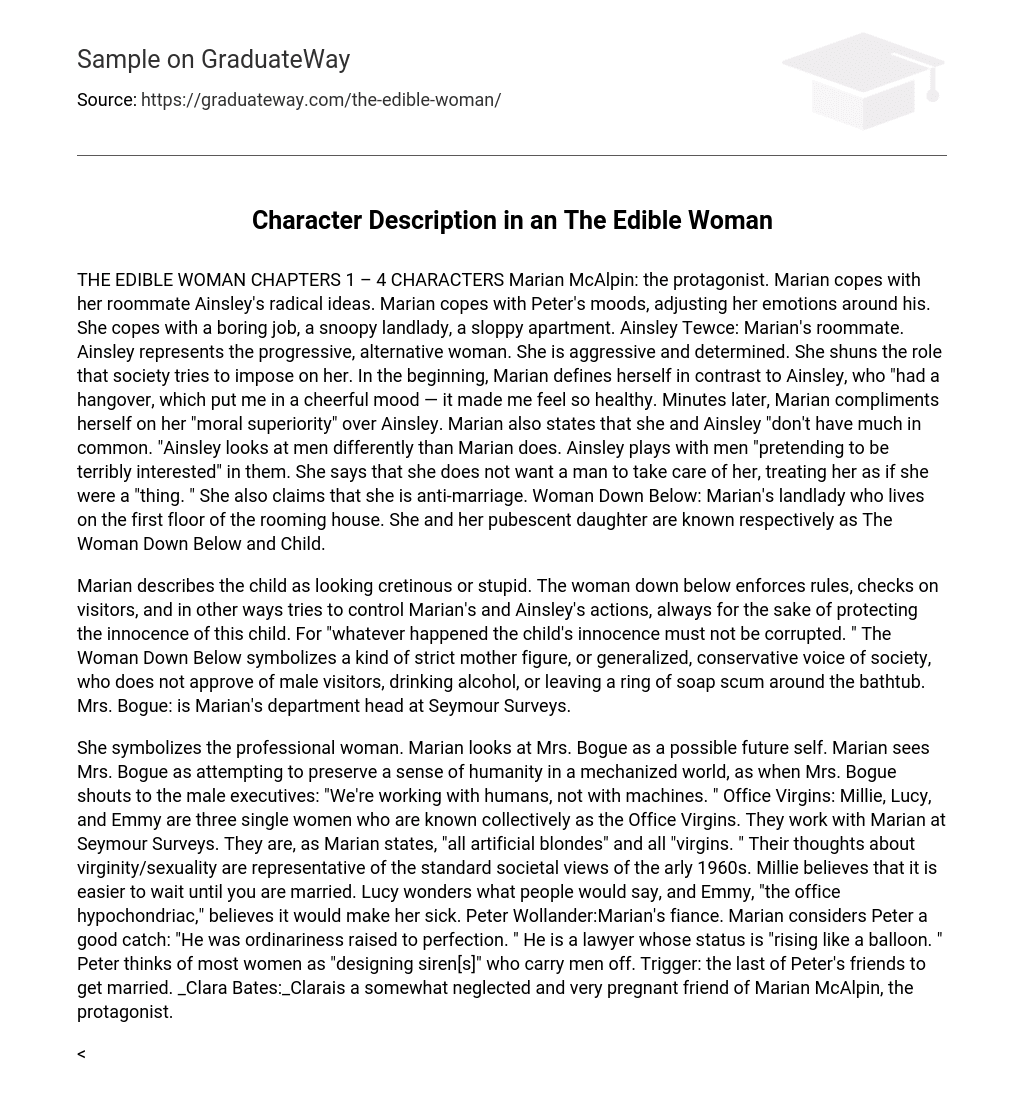Marian McAlpin: the protagonist. Marian copes with her roommate Ainsley’s radical ideas. Marian copes with Peter’s moods, adjusting her emotions around his. She copes with a boring job, a snoopy landlady, a sloppy apartment.
Ainsley Tewce: Marian’s roommate. Ainsley represents the progressive, alternative woman. She is aggressive and determined. She shuns the role that society tries to impose on her. In the beginning, Marian defines herself in contrast to Ainsley, who “had a hangover, which put me in a cheerful mood — it made me feel so healthy. Minutes later, Marian compliments herself on her “moral superiority” over Ainsley. Marian also states that she and Ainsley “don’t have much in common. “Ainsley looks at men differently than Marian does. Ainsley plays with men “pretending to be terribly interested” in them. She says that she does not want a man to take care of her, treating her as if she were a “thing. ” She also claims that she is anti-marriage.
Woman Down Below: Marian’s landlady who lives on the first floor of the rooming house. She and her pubescent daughter are known respectively as The Woman Down Below and Child. Marian describes the child as looking cretinous or stupid. The woman down below enforces rules, checks on visitors, and in other ways tries to control Marian’s and Ainsley’s actions, always for the sake of protecting the innocence of this child. For “whatever happened the child’s innocence must not be corrupted. ” The Woman Down Below symbolizes a kind of strict mother figure, or generalized, conservative voice of society, who does not approve of male visitors, drinking alcohol, or leaving a ring of soap scum around the bathtub. Mrs. Bogue: is Marian’s department head at Seymour Surveys.
She symbolizes the professional woman. Marian looks at Mrs. Bogue as a possible future self. Marian sees Mrs. Bogue as attempting to preserve a sense of humanity in a mechanized world, as when Mrs. Bogue shouts to the male executives: “We’re working with humans, not with machines. ” Office Virgins: Millie, Lucy, and Emmy are three single women who are known collectively as the Office Virgins. They work with Marian at Seymour Surveys. They are, as Marian states, “all artificial blondes” and all “virgins. ” Their thoughts about virginity/sexuality are representative of the standard societal views of the arly 1960s. Millie believes that it is easier to wait until you are married. Lucy wonders what people would say, and Emmy, “the office hypochondriac,” believes it would make her sick.
Peter Wollander: Marian’s fiance. Marian considers Peter a good catch: “He was ordinariness raised to perfection. ” He is a lawyer whose status is “rising like a balloon. ” Peter thinks of most women as “designing siren[s]” who carry men off. Trigger: the last of Peter’s friends to get married.
Marian has difficulties talking to Clara. Marian states that “more and more, Clara’s life seemed cut off from her, set apart, something she could only gaze at through a window. ” Clara is pregnant with her third child at the beginning of the story. She dropped out of college with her first pregnancy and has been having children ever since. She describes her children as “barnacles encrusting a ship and limpets clinging to a rock. ” Clara is a symbol of traditional motherhood as well as an extreme example of someone who has made a very literal self-sacrifice by giving up her studies to have her children.
Clara is also used as a contrast to Ainsley’s more radical approach to motherhood. Marian describes Clara in terms such as weary, isolated, bored, and needing rescue. Joe Bates: Clara’s husband. He is a philosophy instructor, and the parent most responsible for keeping his children fed and diapered. He cleans house and cooks, and tends to think of “all unmarried girls as easily victimized and needing protection. ” Joe is very protective of Clara to the point of believing that she (and all women) “shouldn’t be allowed to go to university at all; then they wouldn’t always be feeling later that they’ve missed out on the life of the mind. Marian describes Joe as a “shaggy man with a slight stoop. ”
Joe stands in contrast to Len Shank who “is horrible with women, sort of a seducer of young girls. ” When Joe is asked what he thinks of Len Shank, Joe says, “He’s not ethical. ” Leonard Shank: an old college friend of Marian and Clara. He is described as a womanizer of very young women. Len stands in opposition to the fatherly role of Joe Bates. Marion describes Len in this way: “He was a self-consciously-lecherous skirt-chaser; but it wasn’t true as Joe had said, that he had no ethical sense.





